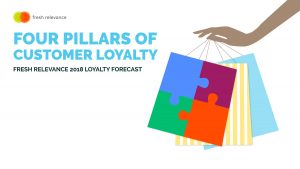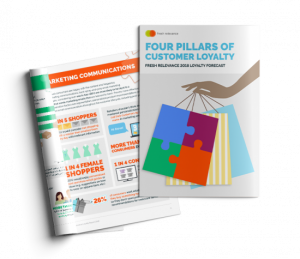 In today’s omni-channel retail environment, brands are stepping on each other’s toes to offer the flashiest deals, rewards programmes and bonus perks, with the goal of capturing long-term consumer attention and turning one-off buyers into repeat, loyal customers.
In today’s omni-channel retail environment, brands are stepping on each other’s toes to offer the flashiest deals, rewards programmes and bonus perks, with the goal of capturing long-term consumer attention and turning one-off buyers into repeat, loyal customers.
Yet, in this abundance of choice, it proves challenging to define what makes the modern shopper keep coming back for more. In its 2018 Loyalty Forecast, Fresh Relevance, the real-time personalisation platform for email, mobile and web, identified the four pieces of the loyalty puzzle, breaking down the touchpoints that create repeat customers, including: Convenience, Experience, Services and Communications. The survey of over 1,000 consumers was commissioned by third party research firm YouGov; the full report can be found here.
Convenience Rules
With an over-saturation of online and in-store options that can satisfy their every need, any slight inconvenience can prompt a shopper to turn to a competitor. Consumers are demanding, with 60% saying they would stop buying from an online store if the website was difficult to navigate. This ease-of-use is especially important to more than two-thirds (71%) of Baby Boomers (age 55+). Retailers would be remiss not to prioritise optimising their e-commerce sites, as nearly half (46%) of respondents state that a frustrating online experience hurts their opinion of a brand overall. More than a third (38%) are unlikely to purchase from a retailer if their mobile site doesn’t function well.
The Age of the Experience Store
Despite the prevalence of eCommerce, physical spaces to “try before you buy” are crucial to a satisfactory customer experience. Nearly half (43%) of consumers want to physically try products, such as apparel, furniture and technology, in-store before they buy online.
Complimentary services are also important to the customer experience, as almost one in four (22%) of shoppers are more likely to be loyal to a brand that offers related amenities like personal stylists or makeovers. Investing in experiential retail is particularly beneficial for brands targeting millennials (18 to 34 years), as more than one in five (22%) would be more likely to purchase from a retailer that offered a unique experience in relation to their offerings (e.g., themed pop-up stores, etc.).
Ease of Services
One way of attracting loyal customers is as easy as simplifying services like shopping and returns. Consumers chose the services most important to them when considering a retailer to regularly engage with, including:
- Free returns (69%)
- Free two-day shipping (68%)
- Free pickup for returns (65%)
- In-store returns at any location for online purchases (55%)
- Same-day shipping (42%)
Yet, emerging forms of expedited check-out and delivery aren’t a major priority for shoppers just yet. Just one in six (17%) said scan & go checkout (a la Amazon Go) is a critical option. However, more than one in four (26%) with children under 18 consider this service important, likely given their tight schedules. Additionally, just nine percent place an emphasis on drone delivery.
Targeted Communications
 To ensure consumers are happy with the content and frequency of marketing communications, marketers should consider bucking spray-and-pray email marketing strategies, considering over one in four (28%) are more likely to be loyal to a brand that sends messages that are tailored to them. However, calling consumers by their first names isn’t an effective personalisation strategy, as more than a third (35%) of consumers don’t find it important.
To ensure consumers are happy with the content and frequency of marketing communications, marketers should consider bucking spray-and-pray email marketing strategies, considering over one in four (28%) are more likely to be loyal to a brand that sends messages that are tailored to them. However, calling consumers by their first names isn’t an effective personalisation strategy, as more than a third (35%) of consumers don’t find it important.
Effective targeting is key, as two in five consumers (41%) would consider not shopping with a retailer that regularly emailed them with irrelevant information. One in four consumers (25%) want to be sent product recommendations based on items they’ve viewed or purchased. A similar percentage of shoppers (26%) also want retailers to notice when they buy something for someone else, so they don’t send promotions or product recommendations for irrelevant items.
“Today’s consumers – namely millennials and Gen X – have reached ‘peak stuff,’ said Mike Austin, co-founder and CEO of Fresh Relevance. “Because they have everything they need and can access anything they want with the click of a button, shoppers quickly turn to a competitor if a retailer is difficult to do business with or treats them just like one in a crowd. Personalisation is the secret to forging repeat, long-term relationships – the key to profitability. Effectively using customer data to build out a tailored marketing strategy around the four pillars of loyalty (convenience, experiences, services and communications) will ensure that shoppers feel valued and satisfied at every touchpoint – resulting in repeat, long-term customers.”
Source: Fresh Relevance

You must be logged in to post a comment Login